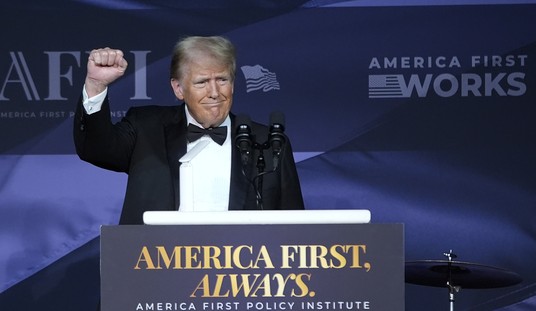An op-ed in the Wall Street Journal co-signed by Patty Murray, Max Baucus And John Kerry has this memorable passage:
None of us ran for office arguing that the United States should see its credit rating downgraded. Nobody ever campaigned in favor of mountains of debt or championed the idea that every American’s interest rates should go up. And no one has ever gone into a debate pledging that China and India should own this economic century because we can’t make our democracy work here at home.
None of you? I can think of at least one, via a 2009 article by Dan Calabrese in the North Star National. Check out the quote from Kerry within it:
Kerry and Sen. Barbara Boxer (D-California) have proposed a new draft for a cap-and-trade bill with exceedingly stringent restrictions on carbon emissions. During a hearing on the bill , Kerry made the astounding statement that the recession has been the environment’s best friend, and he couldn’t be happier about it:
Let me emphasize something very strongly as we begin this discussion. The United States has already this year alone achieved a 6 percent reduction in emissions simply because of the downturn in the economy, so we are effectively saying we need to go another 14 percent.
What did Kerry just unwittingly admit? He admitted that cap-and-trade advocates and like-minded global warming believers see economic prosperity as a huge source of the supposed problem. That’s why they’re proposing the perfect solution – from their perspective – in the form of a massive tax increase directly on industry.
Nothing discourages productive economic activity like confiscatory taxes on said activity. The same people who lament the loss of manufacturing jobs in the United States now seek to multiply these losses many times over by making it economically impossible for manufacturers to operate.
The taxes aren’t designed to encourage manufacturers to run cleaner shops. Taxes don’t do that. Technology does that. If the technology was sufficiently mature and affordable, they would have it now. All things being equal, no one wants to pump dirty emissions into the air if given a reasonable alternative.
So when Democrats propose to pressure them into cleaning up their emissions with crippling taxes, it makes about as much sense as when they suggested the Iraqi government was sitting around eating bon-bons while the U.S. did all the heavy lifting, but would surely get serious if the U.S. threatened to leave.
People want to do things that are in their own best interests. You don’t hammer them into doing these things with taxes. Quite the contrary, you try to remove economic barriers that may be preventing them from doing these things.
But that’s not the goal of cap-and-trade supporters. Kerry has given away the game. The goal is less productive economic activity, because the fact of the matter is that productive economic activity produces carbon, and no arrogant member of Congress or anyone else can change that fact.
But the recession, hey, that’s working like a dream. Carbon emissions are down 6 percent. Damn. How many more big industrial conglomerates do we have to put out of business to get to 20 percent?
Earlier this year, Sen. Claire McCaskill (D-MO) let the mask slip herself, getting caught on camera telling her supporters:
“Well, the good news is, our [carbon] emissions are way down because of the recession. I mean, really, if you want to find a silver lining in the cloud, the number that we were looking for [with cap and trade legislation] … we are well, well [ahead of our goal]…because we have had such a real drop in manufacturing output.”
And since I’ve been meaning to link to this for a while now, you know what would also be good for reducing the deficit? Stop the federal government from spending $4,000 a ticket to subsidize rural airports:
You’ll remember the ironically-named Essential Air Service program from the FAA extension debate. The $200 million program was one of two issues on which Senate Democrats refused to budge, opting to suspend infrastructure spending and revenue generation rather than to let Republicans cut subsidies for 13 airports. Finally a compromise was struck under which Republicans would formally eliminate the program — because Senate Democrats couldn’t really defend paying for empty planes to fly into empty rural airports — but Transportation Secretary Ray LaHood would be allowed to very quietly waive the cuts. Guess how that went.
The Associated Press followed up on the story today, using the town of Ely, Nevada as an illustration. There are plenty of days when the airport gets planes with exactly zero passengers, and across the entire year flights average 1 or 2 passengers per flight. Last year exactly 227 passengers departed from the Ely airport terminals, with each passenger paying between $70 and $90 for their heavily-subsidized one-way tickets. The difference between the full price and what each passenger paid was left for taxpayers to pick up. Average price per ticket: $4,107.
The article goes on to quote Prof. Severin Borenstein of the University of California, Berkeley, who helped design EAS and who now thinks that there is a “big problem” with giving subsidies to airports like Ely. That’s one way of putting it.
Which is another reminder that the Federal government is now so big that it frequently works at cross-purposes. President Obama can hector Americans that “We can’t drive our SUVs and eat as much as we want and keep our homes on 72 degrees at all times … and then just expect that other countries are going to say OK. That’s not leadership. That’s not going to happen.” but it certainly can in another branch of the same government that has no problem wasting fuel — and money — on unnecessary flights. (See also: the crony corporatism of Amtrak, for the ground-based equivalent of the same phenomenon.)










Join the conversation as a VIP Member